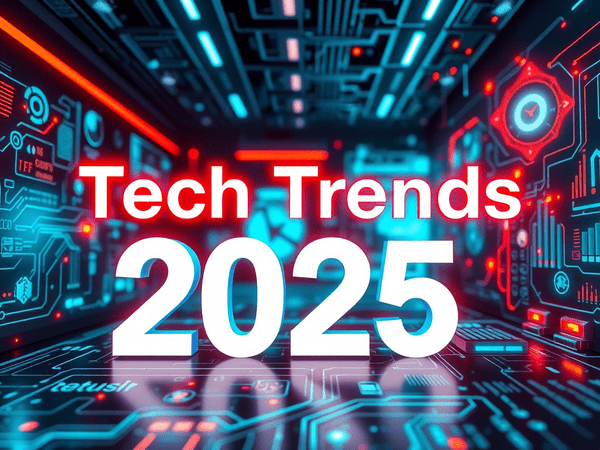5 Game-Changing Tech Trends You Need to Know in 2025

Transforming both our everyday lives and enterprises by 2025, technology is quickly changing. If we want to stay ahead, we must understand the newest technological advancements, like improved machinery, faster internet, and safe data systems. These five vital game changing tech trends will influence the digital landscape this year.
Blockchain: Beyond Cryptocurrency
Its utilization goes beyond only financial transactions although digital currencies like Bitcoin assisted popularize blockchain technology. Blockchain will play a main role in upgrading online interactions across a range of industries in terms of clarity, safety, and trust in 2025. Supply chain management is one of blockchain's best apps. Businesses can utilize records to trace products and transactions to guarantee authenticity, source verification, and fraud stop.
This is especially vital in sectors where tracking everything is vital, like farming, high-end items, and medicine. Digital identity and secure voting systems are two more essential areas where technology is being deployed. Blockchain can give vote records and digital identities that are reliable and safe, reducing the likelihood of fraud.
By governments and groups to restore public confidence in democracy, decentralized voting systems are being considered. In the healthcare industry, blockchain facilitates the safe exchange of medical records. Data is kept confidential and patients have more control over their information. Healthcare providers are enhancing data sharing and removing obstacles that keep information apart. Blockchain will evolve from a specialized tool to a global system for safe decentralized applications with better regulations and technology by utilizing advanced technologies. Individuals are discussing how quickly blockchain will transform sectors instead of whether it will by 2025.

Quantum Computing: Unlocking New Realities
Quantum computing is increasingly influencing practical applications and has the potential to completely transform computer capabilities once limited to research labs. Unlike conventional computers that utilize binary bits, quantum computers use qubits, which can exist in numerous states at once. This enables them to handle some problems far more quickly and effectively. In 2025, quantum computing—which has both advantages and risks—is being investigated in significant domains like secret codes.
Current security protocols are at risk from quantum computers, which is why governments and businesses are making systems that are stopping quantum attacks. The discovery of new medications is an exciting additional utilize. The ability of quantum simulations to produce incredibly precise models of molecules speeds up the process of discovering strong new medications. Companies in the pharmaceutical and quantum computing industries are working together to accelerate research and provide patient-specific treatments. Quantum computing is having a vital impact on the fields of finance, transportation, and climate change research in addition to science and medicine.
These computers utilize data analysis that is beyond the capacity of regular computers to enhance complicated systems like investment portfolios and supply chains. We are having success in the early phases of product sales with an emphasis on hardware stability, qubit coherence, and quantum algorithms. From a notion to a game-changing technology, the world can change in the 2020s as quantum computing moves.
5G Expansion: The Future Network
By 2025, 5G has recently gained a lot of attention and is predicted to be nearly ubiquitous. 5G's lightning-fast internet, lightning-fast response times, and seamless multi-device connectivity are changing the digital world. Simply said, 5G enables faster data transfer than previous wireless networks were able to give. For fresh and better entertainment, this enhances online gaming, AR and VR experiences, and watching high-quality videos.
For daily users, this entails taking the benefit of real-time apps for more captivating experiences, online concerts, and gaming without delays. The main advantage of 5G is its strong effect on many various areas of business. With traffic control systems and other vehicles, autonomous vehicles are making split-second decisions based on real data and continuous communication. 5G enables the reliability and speed for such communications to happen. 5G will manage city infrastructure and allow cities to bring faster responses by employing various means of sensors in urban centers. It works together with emergency responders, traffic lights, and cameras.
While decreasing downtime and idle time, 5G will also support communications between automated equipment, robots, and machines, thus improving productivity in manufacturing processes. The healthcare field is equally being changed by 5G with innovations like surgery from a distance, virtual appointments, and real-time tracking for health. It will become a major driver of a connected world, serving as the foundation for the union of technologies that will change into systems requiring seamless, reliable, and fast communication as 5G ultimately grows.
Edge Computing: Peripheral Power
Instead of depending on large cloud servers, edge computing processes data closer to its source and at the network's edge. Local solutions are faster, safer, and smarter and can make better adaptive decisions at the moment. Edge computing is going to be extremely important in 2025 for businesses that need to act and perform fast. Autonomous vehicles are prime examples to consider, as autonomous vehicles have to read and identify data from a camera and sensor to quickly avoid an accident.
Internet connection is fickle in ERCs and factories that exist in extreme circumstances and times of need. Local processing keeps the systems operational even in the event of an internet connection outage. Edge computing is changing the Internet of Things (IoT) and how we interact with billions of devices that will need connectivity - with billions more coming to the market. Edge devices offer faster responses and ease network strain by locally authenticating such data. A manufacturer sensor sends alerts of impending repairs before machines break down, and a smart thermostat adjusts levels based on domestic usage.
Edge computing is utilized in healthcare to provide consumers and physicians with instant feedback through wearable devices and monitoring systems. Additionally, it is important for the aerospace and defense industries, where instant decision-making is paramount. Furthermore, to cloud services, edge computing speeds up data processing, allowing for rapid real-time response. Its trajectory will continue in 2025 as more people seek fast, secure, and scalable solutions.
Generative AI: The Creative Revolution
Generative AI is expected to be one of the biggest game-changing technologies in 2025. It can generate human-like content, including realistic images, clear text, lifelike sounds, and engaging simulations. What makes generative AI special is that it can do many different things. It's evolved beyond novelty to become a vital tool in marketing, design, entertainment, healthcare, and software development. This year, we are seeing quick improvements in models like GPTs, diffusion models, and multimodal AI systems.
These systems can create text, images, and videos together. These tools help automate tasks, spark creativity, and craft personalized user experiences for creators, developers, and businesses. Making content that used to take days or weeks can now be done in minutes with some good prompts. In business, generative AI is changing how companies handle customer service, market research, and product design. AI-created marketing campaigns, empathetic virtual assistants, and on-demand prototyping tools are some examples of innovative technologies available.
In education, special tutoring systems using advanced technology are helping to fill learning gaps with interactive and customizable materials. As we get further into 2025, we can expect generative AI to be used more in our daily tasks. From small businesses to large companies, organizations are using these tools to work better, create new ideas, and stay competitive. Generative AI is democratizing creativity and innovation, reshaping the global economy—a trend that is just beginning.
Conclusion
In 2025, Generative AI, Blockchain, Quantum Computing, 5G, and Edge Computing are revolutionizing business, enhancing daily life, connectivity, and innovation. They affect every area, including health, money, entertainment, and transportation. Using these technologies helps us work better, make things easier for users, and stay ahead in a changing world. These trends coming together means a future where smart technology, quick processing, and strong security work smoothly together. Both people and organizations need to understand and use these new technologies to succeed in the future.








